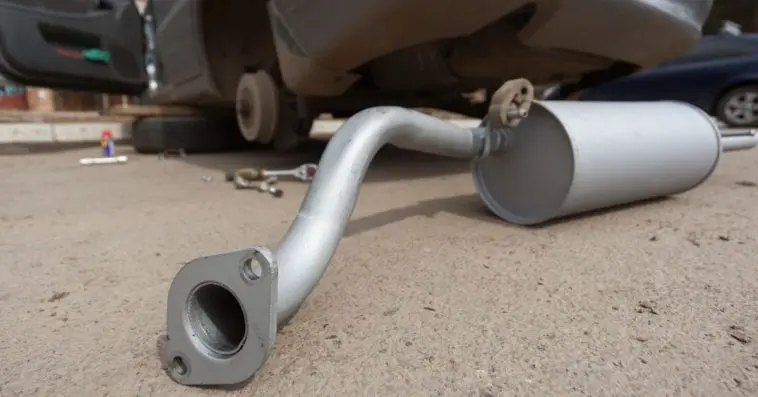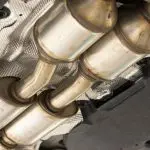A car is full of intricate engineering. Nothing is excessive. Every part has a role to play to make the whole machine work seamlessly.
Muffler repair and replacement costs could be a small drop in the bucket ($150 to $350) if bigger problems arise from a poorly performing or bust unit.
We tend to focus on the bigger things when we think about maintenance – especially the things we can see. A chip on the paintwork will work us into a frenzy.
We can see when the tires are worn, so they warrant attention. But the things we can’t see are the parts we often neglect.
And they are the ones that end up costing us a bundle when they finally hive up the ghost!
Your muffler is at the rear of your vehicle, on the underside. And it’s one of those critically important components without which your car can’t run at all, or at the very least, can’t run well.
We think of the muffler only as a noise reduction component. And yes, it does that. But it also controls the engine’s backpressure. If it does this well, your car will perform better and last longer.
But restrictive exhaust flow – one that builds up back pressure – reduces the power your vehicle can deliver.
Typically, excessive, often unbearable noise from your exhaust system will be your cue that your muffler is bound for the hereafter. There are other signs too.
TABLE OF CONTENTS
How Much Does It Cost To Replace A Muffler?
If things have gone to the hot zone in a handbasket, and your muffler needs to be replaced, you’re probably in for around $150 to $350.
This obviously depends on your vehicle make and model. And the type of muffler you buy.
If you need to save a few bucks, look for a good aftermarket muffler. These can be really good and they’re cost-effective.
High-performance or luxury cars will have premium mufflers, and these will up the price, maybe even substantially.
How Much Does It Cost To Repair A Muffler?
If it’s a hole or some rust, nine out of ten times you’d be able to repair the muffler. There are a variety of specialty pastes on the market, and various tapes and patches can do the job equally well.
If the damage is not severe, you could probably tackle this as a run-of-the-mill DIY project.
If it’s more than that, better have a professional look at it. Sections of piping and tailpipe connections are not usually DIY jobs.
But even in this scenario, it should put you more than $200 out of pocket. But the diagnostic fee may well push the price up.
The best way is to first do a visual check of the muffler. Look for clear and present signs of damage. And then decide.
How Does A Functioning Muffler Prevent Repair And Replacement Costs?
The muffler is the final part of the system exhaust gasses passes through on their way from the engine to the atmosphere.
Your engine has hundreds of working parts and works under immense pressure. All of these create sound.
Your engine is a relatively sealed unit, and the first exit point for these sounds is the exhaust system.
They travel with the exhaust gasses and hit the atmosphere beyond your vehicle once they’ve passed through the muffler.
Without a muffler, those sounds would be much, much louder by the time they exit into the outside world.
A chambered muffler redirects the sound waves back into each other.
So, they effectively cancel one another out. It’s a bit like noise-canceling headphones that emit a specific frequency to neutralize noise before it reaches your ears.
The other type of muffler your car might have is a turbo muffler. This is a step up from a chambered muffler.
In a turbo muffler, the exhaust gasses travel down a series of perforated tubes. These tubes are enclosed in scientifically developed sound-canceling materials.
Older cars are more likely to have chambered mufflers, while most newer cars employ the turbo muffling technology.
The third type is a straight-through muffler. Here the gasses travel straight down the pipe, but the muffler converts them into heat instead of sound.
These straight-through mufflers are great performance enhancers because the gasses flow freely instead of creating back pressure that reduces performance.
They’re loud, though! And they don’t often sport a catalytic converter, which as you know, is a requirement on newer vehicles to lower the emission of greenhouse gasses.
How Do You Know If Your Muffler Is Bad?
1. The Sound Is A Dead Giveaway
In defense of bust mufflers everywhere – it’s important to understand how much abuse they take.
Because of their position on your car, they ride close to the ground. They pick up stones and other debris, and also a lot of water in wet conditions.
Wear and tear will cause small (or bigger) holes over time, as will rust.
The result will be a loud growling noise from the tailpipe. A bit like a male lion with a nose full of red ants!
2. Your Fuel Economy Tanks
If you’re spending more time and dollars at the gas pump, your muffler may very well be the culprit.
If it is not doing its job properly, your engine works harder. And if your engine works harder, it gets the energy to do so by burning more fuel. It’s like dominos. All you have to do is topple the first one…
If your muffler develops an unhealthy issue, it will throw everything else out of balance, and this can cost you money if you don’t have it looked at.
3. Shake, Rattle, And Roll
Knocking sounds, a persistent rattling, or constant banging maybe your muffler acting out too.
Depending on what you drive, you don’t want to hear anything from your tailpipe other than an even murmur. Noises beyond that suggest attention is needed. Perhaps even urgently.
This is one case where the decibels of the noise will tell you how urgent the problem is. More noise, greater urgency.
If it sounds like a knocking sound, or if you hear a constant banging under your vehicle when you drive, it may be loose mounts.
These mounts aren’t always the best quality, and they aren’t made to last the lifetime of the vehicle.
If they come loose, it may cause your muffler to back against the underside of your vehicle, especially when you accelerate, or it may be dragging on or bouncing off the road surface.
If there is a rattling sound, your catalytic converter may be in the process of failing. The converter reduces the toxic air leaving your tailpipe.
Related article: How To Clean A Catalytic Converter
4. The Smell Will Tell You
Gasses from spent fuel leaving your tailpipe are hazardous to your health. They could even, and have been, fatal.
That’s why the tailpipe is at the rear of your vehicle – to minimize the chances of you breathing in those gasses.
The toxic-gas list reads like the who’s who of gas killers:
- Carbon monoxide (the one we all know)
- Nitrogen oxide
- Formaldehyde
- Benzene
- Nitrous oxide
- Sulfur dioxide
- Polycyclic hydrocarbons
I’m sure you’re beginning to see why the health of your muffler specifically, and your exhaust system in general, are so important. It doesn’t only help your car function better. It protects your health.
Gassy odors (they usually have a sweetish smell) inside your vehicle means you need to have your muffler and exhaust system checked out immediately.
Your muffler may have holes or cracks, or your catalytic converter may be greeting you.
5. Acceleration Is Like Rolling A Boulder Uphill
You know your car well. You’ll notice when something’s amiss. If your car struggles when you put your foot flat, your exhaust and muffler should be your first check.
If it leaks, it could cause all kinds of issues with performance.
Your engine bangs like a gunfight in a spaghetti western
If your engine misfires, your fuel economy will suffer, as will your acceleration.
It’s usually an incorrect air to fuel mixture in the combustion chamber, and your muffler and exhaust system may very well be responsible for this.
There could be other causes, but a thorough check of your exhaust system is warranted.
Muffler issues shouldn’t be ignored. Like, ever. Your car engine is very much a case of one thing leads to another.
And you don’t want the “another” because that’s usually a lot more costly than the initial one thing…
Now for the happy news. Unless your muffler is torn to shreds or suffered a complete blowout, it’s more than likely you can repair it. And a repair is often a lot less costly than a replacement.
A Parting Shot
The temptation is always there to simply drive until the car doesn’t want to go anymore. And then take it in for repairs. Years of driving have proven that this is an expensive route to follow.
Always remember – your car, no matter how small or bottom-of-the-range – is a finely honed piece of engineering.
It works with tremendous pressures and heat, and the mere fact that it goes makes it a mechanical marvel.
A little bit of preventative maintenance, and the proper attention early on if something seems out of kilter, not only saves a bag of money but is also likely to increase the longevity of your car substantially.
And we’re not even talking about the resale value …




